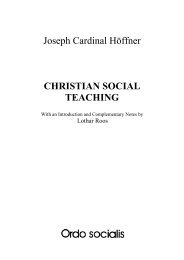Prof. Franz Josef Stegmann Bethlehem Social ... - Ordo Socialis
Prof. Franz Josef Stegmann Bethlehem Social ... - Ordo Socialis
Prof. Franz Josef Stegmann Bethlehem Social ... - Ordo Socialis
Create successful ePaper yourself
Turn your PDF publications into a flip-book with our unique Google optimized e-Paper software.
<strong>Stegmann</strong><br />
reflection; neither do they “fall from heaven", but grew and are growing from the experiences<br />
and needs of human coexistence.<br />
Secondly, knowledge of facts includes “functional knowledge” that is learnt from the social<br />
sciences such as sociology, economics, history, political science, etc.. They teach us how<br />
human coexistence "functions" and describe the political, economic, cultural and other factors<br />
by which it is determined today and was determined in the past.<br />
Apart from functional knowledge, there is a third factor, the scope and content of which are<br />
difficult to define. This factor is the basic stock of generally comprehensible structures,<br />
meanings and values; for instance, the right of every human being to own and use those things<br />
necessary for his/her life, or that without a minimum of truthfulness the social life of human<br />
beings is impossible - no matter how many reservations, exceptions and distinctions are made<br />
in individual cases. Thus, throughout the history of man, all peoples have known unacceptable<br />
killings and detestable "murder'', even if the boundaries between criminal murder and ritual<br />
killing, the killing of an enemy, the killing of a criminal, burning of widows, etc. have often<br />
been unclear and vague.<br />
This basic stock of values and norms - which is hard to define - is derived from the reality of<br />
the human being and proceeds from the background of general human experience. Human<br />
coexistence cannot succeed when the physical integrity of human individuals is not protected,<br />
when their moral freedom is not guaranteed, or when a human social life is not possible.<br />
The essential features of these and similar insights can be recognised by the human mind and<br />
are available to everyone. The reflecting reason shapes them into legal norms and rules of<br />
action. In the historical process of human self-recognition, there is definitely a progress which<br />
must be maintained if mankind is to live a decent and humane life. Today, for instance,<br />
slavery has to be judged as a grave and direct offence against human dignity and natural law,<br />
although in ancient times and even in the Middle Ages, it was justified by saying that some<br />
people need direction by "a wiser man.” 15<br />
In our context, knowledge of facts implies all three of the above-mentioned fields. Political<br />
action, economic action, etc. must depend on and be guided by this insight into the social<br />
reality - an insight of which the natural light of human reason is capable.<br />
Furthermore, due to its pluralistic world view, the society in which we now live needs a<br />
concept of social order, the essentials of which are generally comprehensible and accessible to<br />
all. This common basis may be narrow and small, but without such a basis, no responsible<br />
cooperation between the different groupings and ideologies in a community will be possible.<br />
lf only for that reason, a set of shared common values and norms is imperative and vital for<br />
society.<br />
What has been considered up to now is, of course, meant for the political or economic actions<br />
of Christians as well. They should, above all, act properly and according to the knowledge of<br />
facts. For example, a Christian doctor cannot operate on an appendix using "Christian<br />
principles"; this can only be done according to medical rules. To behave as a Christian<br />
demands that one always acts as professionally as possible. The "Christian frame of mind"<br />
demands - coming back to the doctor -that he/she no longer handle a scalpel when his/her<br />
fingers begin trembling. Regarding political action, Pope John XXIII therefore rightly<br />
15 Thomas Aquinas, Summa theoloiae, 2 II, q57, a3, ad 2; q104, a5.<br />
9















